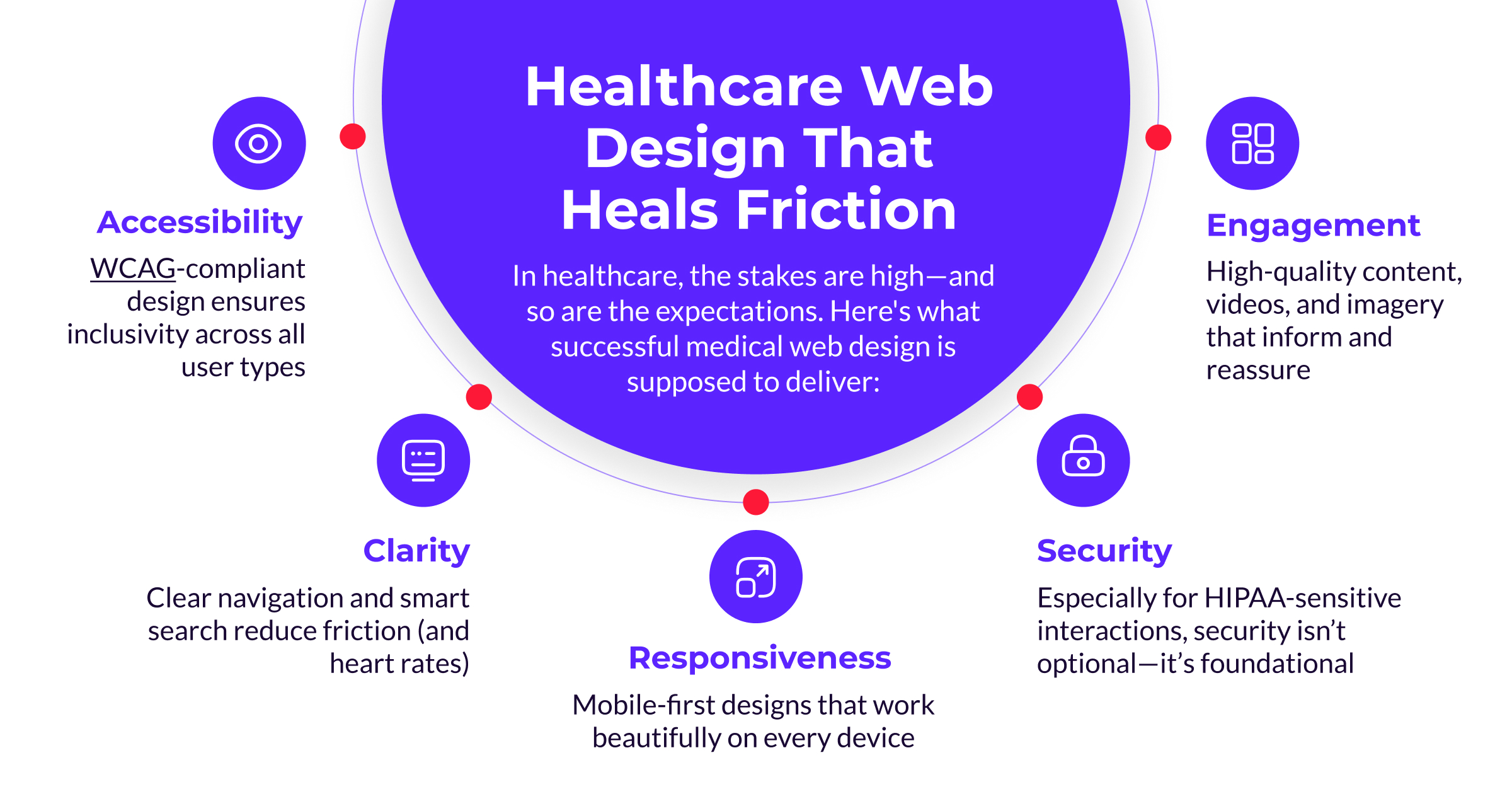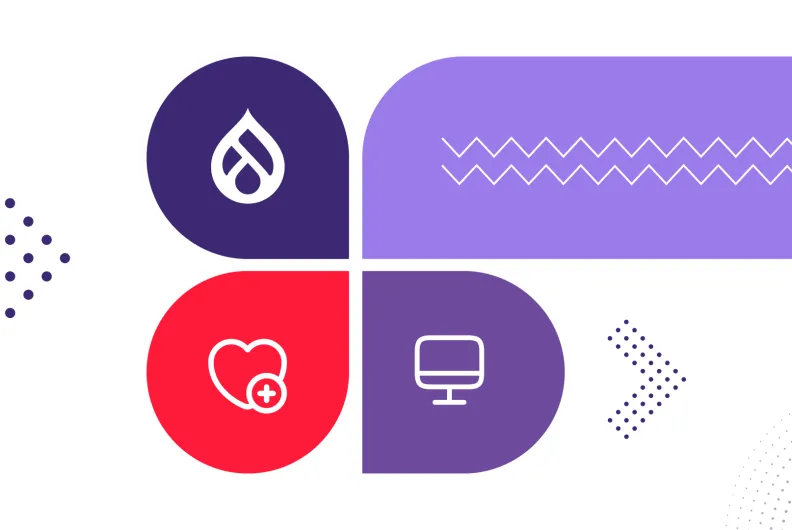6 Reasons Why Drupal is the Right Prescription for Healthcare Websites
In healthcare, trust is everything. Your website isn’t just a marketing tool—it’s your front door, your patient portal, your public health educator, and your brand ambassador. And with nearly 80% of people searching for medical information online, that door had better open quickly, securely, and intuitively.
Whether you're a hospital network, clinic, or health tech innovator, having a secure, user-friendly, and scalable medical website design is mission-critical. The best health care websites don’t just look good; they help users book appointments, access resources, and feel confident they’re in good hands.
So how do you build a digital experience that balances compliance with compassion? Function with flexibility? Ease of use with enterprise-grade security?
One word: Drupal—a powerful, open-source CMS that's exceptionally well suited to the unique demands of healthcare.

And while many CMS platforms can start the job, few are built to evolve with your organization. That’s where Drupal for healthcare shines.
Here’s Why Drupal Is the Right Fit
Drupal is an open-source healthcare CMS built for complex needs. Used by world-class institutions like the Cleveland Clinic and Pfizer, Drupal’s reputation isn’t just built on features—it’s built on outcomes. For healthcare organizations juggling HIPAA compliance, complex integrations, and ever-changing content needs, Drupal delivers the needed flexibility without compromise.
1. Security: A Non-Negotiable in Healthcare
Let’s start with the obvious. In healthcare, compliance isn’t optional—especially when it comes to patient data. Drupal has a longstanding reputation for strong security, which is one reason it powers sites for the likes of the CDC and the NIH.
With Drupal, you get:
- Granular user permissions so only the right people can access sensitive content
- Regular security updates from one of the largest open-source communities in the world
- Secure integrations with EHRs, CRMs, and other tools via API—without exposing patient info
- HIPAA-aligned development practices when implemented with care
The result? You can build patient trust and keep your legal team happy.
2. Flexibility That Matches the Complexity of Healthcare
Hospitals, clinics, nonprofit health systems, private practices... The healthcare landscape is anything but one-size-fits-all. And Drupal doesn’t try to be. Its open-source architecture means your website can be whatever you need it to be—no compromises, no convoluted workarounds.
- Want to spin up microsites for each specialty? No problem.
- Need multilingual content for diverse patient populations? Easy.
- Running multiple locations with distinct services, staff, and content needs? Drupal’s multisite capabilities have you covered.
Whether you’re building a central hub for a major hospital network or a focused site for a single service line, Drupal adapts. And keeps adapting as your organization grows or evolves.
3. Scalable Content Management for Large, Busy Teams
Content is king in healthcare—from wellness blog posts and preventive care campaigns to provider bios and service descriptions. But managing that content across a sprawling organization? That’s where many platforms fall short.
Drupal, on the other hand, was built for this.
- Create custom content types for everything from doctor profiles to treatment FAQs
- Use smart taxonomies to organize information logically and keep navigation intuitive
- Assign custom workflows and approvals for different teams, departments, or regions
- Enable non-technical editors to update content without risking the site’s integrity
Need to manage 10,000 pages? Drupal won’t even blink.
4. Accessibility and Compliance: Built In
Healthcare websites must serve everyone—including people with disabilities, older users, and those with limited tech literacy. Drupal’s commitment to accessibility makes it easier to meet (and exceed) WCAG standards.
- Accessible themes and templates out of the box
- Robust configuration and module ecosystem for alt text, semantic markup, keyboard navigation, and more
- Multilingual capabilities baked right in
Compliance is more than a checkbox—it’s a commitment to care. Drupal helps you keep that promise.
5. Integration-Ready (Because Silos Don’t Work in Healthcare)
Need to integrate with Salesforce Health Cloud? A learning platform for CME? Your patient portal or scheduling software?
Drupal’s modular design and API-first architecture make integrations seamless. It can talk to your EHR, marketing platforms, CRM, or donor systems—whatever your digital ecosystem looks like.
No more duct-taped integrations or siloed data. Just smooth, efficient workflows that help your teams serve patients better.
6. Open Source = Budget-Friendly and Future-Proof
Proprietary software licenses can eat up your budget—fast. Drupal is open-source, which means no licensing fees, more budget for real value (like strategy, design, and ongoing optimization), and total freedom over your technology choices.
Plus, with a global community constantly improving the platform, you’re never locked into yesterday’s tech.
Why Drupal + Healthcare Just Makes Sense
In a field where regulations evolve, user expectations shift, and technology never stops moving, you need a digital foundation you can trust.
Drupal is:
- Secure
- Flexible
- Scalable
- Accessible
- Cost-effective
- Ready for what’s next
And with the right implementation partner, it’s not just a CMS—it’s your digital transformation accelerator.
Real-World Results: Healthcare Websites in Action
From patient education to public health data, we've partnered with healthcare organizations to design and develop Drupal websites that deliver real value:
Careforth (formerly Seniorlink)
When Careforth needed a seamless, secure, and user-friendly learning platform to support family caregivers, we rebuilt their Vela Learn site on Drupal 10—aligning it with their rebrand and enhancing the UX for both caregivers and partners. The result? Higher engagement, improved accessibility, and stronger reporting capabilities. Read the full case study →
New Brunswick Health Council (NBHC)
NBHC turned to ImageX to elevate how they share health system data with the public. We helped redesign their Drupal website with dynamic filtering, dual-language support, and improved chart and map visualizations. Their team now spends less time managing data—and more time engaging citizens in better health outcomes. Read the full case study →
Let’s Build a Healthier Web Experience, Together
Whether you’re planning a complete redesign or mapping out your next digital phase, we’re here to help. From strategic discovery to ongoing support, we’ve helped healthcare organizations launch sites that are as powerful as they are patient-friendly.
Need proof? Check out this guide on how enterprise Drupal unlocks marketing potential, or dive into our breakdown of what a flexible CMS can really do.
Your mission is to serve and support health. Ours is to build the platform that helps you do it better.
Contributors





